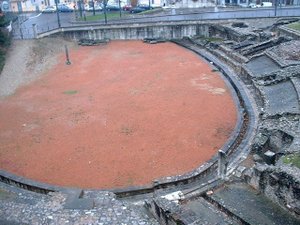
Persecution in Lyons
Encyclopedia

Church History (Eusebius)
The Church History of Eusebius, the bishop of Caesarea was a 4th-century pioneer work giving a chronological account of the development of Early Christianity from the 1st century to the 4th century. It was written in Koine Greek, and survives also in Latin, Syriac and Armenian manuscripts...
, book 5, chapter 1.
Background on Persecutions
W. H. C. Frend noted that the legal situation of Christians was "riddled with ambiguities" (164-65). The policy worked out by Pliny the YoungerPliny the Younger
Gaius Plinius Caecilius Secundus, born Gaius Caecilius or Gaius Caecilius Cilo , better known as Pliny the Younger, was a lawyer, author, and magistrate of Ancient Rome. Pliny's uncle, Pliny the Elder, helped raise and educate him...
and the Emperor Trajan
Trajan
Trajan , was Roman Emperor from 98 to 117 AD. Born into a non-patrician family in the province of Hispania Baetica, in Spain Trajan rose to prominence during the reign of emperor Domitian. Serving as a legatus legionis in Hispania Tarraconensis, in Spain, in 89 Trajan supported the emperor against...
a few decades earlier declared Christianity to be illegal, but that members of the faith were not to be sought, but punished if the charge was proven. Trajan also added "that if any one [Christian] denies that he is a Christian" by worship of the Roman gods, that person is to be released. Tertullian
Tertullian
Quintus Septimius Florens Tertullianus, anglicised as Tertullian , was a prolific early Christian author from Carthage in the Roman province of Africa. He is the first Christian author to produce an extensive corpus of Latin Christian literature. He also was a notable early Christian apologist and...
, in chapter 2 of his Apology, would later criticize Roman policy since criminals were normally tortured to confess their crimes, while Christians were tortured to renounce their faith in Christ.
Account of the Persecution
Before the actual outbreak of violence, Christians were forbidden from public areas such as the marketplaces, baths, etc. The populace also attacked the Christians, robbing them, and subjecting them to other forms of abuse (HE, 5.1.5,7).How long all of this lasted is not indicated, but eventually the authorities seized the Christians and questioned them in the forum in front of the populace. They were then imprisoned until the arrival of the governor. When the governor arrived, he interrogated them in front of the populace again, mistreating them to such a degree that Vettius Epagathus, a Christian and man of high social standing, requested permission to testify on behalf of the accused. This request was refused and instead the governor arrested Vettius Epagathus when he confessed to being a Christian (5.1.9-10).
These Christians endured torture while the authorities continued to apprehend others. Two of their pagan servants were seized and, fearing torture, falsely charged the Christians with incest and cannibalism (5.1.12-13).
What followed was the torture of the captive Christians by various means. In the end, all were killed, some of whom had recanted but later returned to the faith (5.1.45-46).
Deaths
- Among the dead, BlandinaBlandina-Martyrdom:In the summer of 177, Irenaeus, bishop of Lyon, witnessed an increasing hostility to Christians in his own city. First they were prohibited from entering public places such as the markets and the baths. Then, when the provincial governor was outside the city, the mob broke loose....
is one of the more famous. - PothinusSaint PothinusSaint Pothinus is a figure of uncertain historicity, who is first mentioned in a letter attributed to Irenaeus of Lyon. The letter was sent from the Christian communities of Lyon and Vienne to the Roman province of Asia....
and several companions were also killed during this time. - Epipodius and AlexanderEpipodius and AlexanderEpipodius and his companion Alexander are venerated as Christian saints. Their feast day is 22 April. Epipodius was a native of Lyon; Alexander was said to be a native of Phrygia, and a physician by profession. They were both martyred during the reign of Marcus Aurelius.Epipodius and Alexander...
- Saint PonticusSaint PonticusPonticus was a fifteen-year-old boy martyred in 177 AD during the persecution in Lyons with a group of other Christians, including Saint Pothinus and Saint Blandina. He is venerated by the Roman Catholic Church as a martyr.-Notes:...

